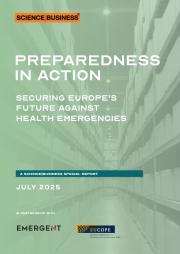A Science|Business closed-door hybrid roundtable (09:30 - 12:30 CEST), in partnership with Emergent and EUCOPE
Given the many challenges Europe is currently facing, defence and security have naturally risen to the top of the EU political agenda. In a tense geopolitical context, with a war on its doorstep and the lingering effects of the COVID-19 pandemic, the EU and its member states must prepare for increasingly complex, cross-border threats. In the aftermath of the pandemic, Europe has taken action to better anticipate future health threats, as evidenced by the establishment of the European Health Emergency Preparedness and Response Authority (HERA) and the creation of rescEU, a “strategic reserve of European disaster response capabilities and stockpiles”. While these efforts at the European level are unprecedented, Europe has not yet reached the level of civilian and military preparedness and readiness needed to face future challenges effectively. In October 2024, in a report commissioned by President von der Leyen, former Finnish President Sauli Niinistö stressed the urgency for Europe to adopt a “more comprehensive and integrated approach” for relevant stakeholders to “be fully ready and capable to respond effectively and seamlessly, as part of a wider whole-of-government and whole-of-society approach”. Since then, the European Commission has issued an EU Preparedness Union Strategy and has an EU stockpiling strategy in the works. As the policy-making process is in full swing, it is critical to connect policy ambitions with operational realities.
Currently, the stockpiling of "medical countermeasures" involves numerous stakeholders navigating fragmented public services, regulatory discrepancies across EU member states, and the absence of a Europe-wide policy framework. The management of supply chains is a challenge for manufacturers of countermeasures such as medicines, vaccines, diagnostic tests and personal protective equipment. In the context of the ongoing review of HERA, now is the time to assess current strategies, responsibilities, policy gaps and funding mechanisms. As the EU and member states have started negotiating the next Multiannual Financial Framework and potential increases in defence spending, Europe has a unique opportunity to strengthen its capacity to better protect its citizens from health and bioterrorism threats, as a core component of the broader security and defence agenda.
Against this backdrop, several aspects warrant further debate and consideration:
- What supply chain vulnerabilities must Europe address to efficiently manage and swiftly deploy countermeasures, strengthen its security capabilities and ensure preparedness for future health threats?
- How to better connect HERA’s field of action (e.g. joint procurements and stockpiling of “medical countermeasures”) with operations at the national level?
- How to ensure sustainable stockpiling solutions through stable funding instruments?
- How can companies and public-private partnerships contribute to improving the efficiency of preparedness mechanisms and building optimal stockpiles of medical countermeasures?
- What policy measures are required to stimulate the production of innovative medical countermeasures, ensuring that research and innovation efforts focus on the practical application of their outcomes in line with EU policy priorities?
- How to divide, coordinate and integrate military and civil protection strategies to increase preparedness?
- How can regional, national, European, and international governance levels better align to ensure the security of European citizens?
On June 4th, Science|Business, in partnership with Emergent and EUCOPE, is convening a selected group of key stakeholders who face those operational challenges, to address them collectively and produce a set of practical recommendations to inform the policy-making process currently underway.























AGENDA
09:00 Welcome coffee
09:30 Welcome by Maryline Fiaschi, Chief Executive Officer, Science|Business
09:35 Navigating the preparedness maze: How do stakeholders operate?
Focusing on ground-level operations, we will gather insights from the stakeholders involved across countries, institutions, and sectors to better understand procurement models, stockpile management, and cross-border collaboration.
10:15 Beyond stockpiling: How to accelerate research to respond to preparedness requirements?
Innovation is key to preparedness. This session focuses on bridging the gap between research and commercialisation, ensuring the timely development of solutions for emerging threats.
11:00 Coffee break
11:30 The power of convergence: Turning strategies into “ready to deploy” action
As the policy-making process has reached a tipping point with clear strategic directions for preparedness, this session examines how policies at various levels of governance—national, EU, and international—can be better aligned to create operational readiness.
12:25 Conclusions
12:30 End of the meeting, Networking lunch
For more information, please contact Denitsa Nikolova at [email protected]
Partners




 A unique international forum for public research organisations and companies to connect their external engagement with strategic interests around their R&D system.
A unique international forum for public research organisations and companies to connect their external engagement with strategic interests around their R&D system.